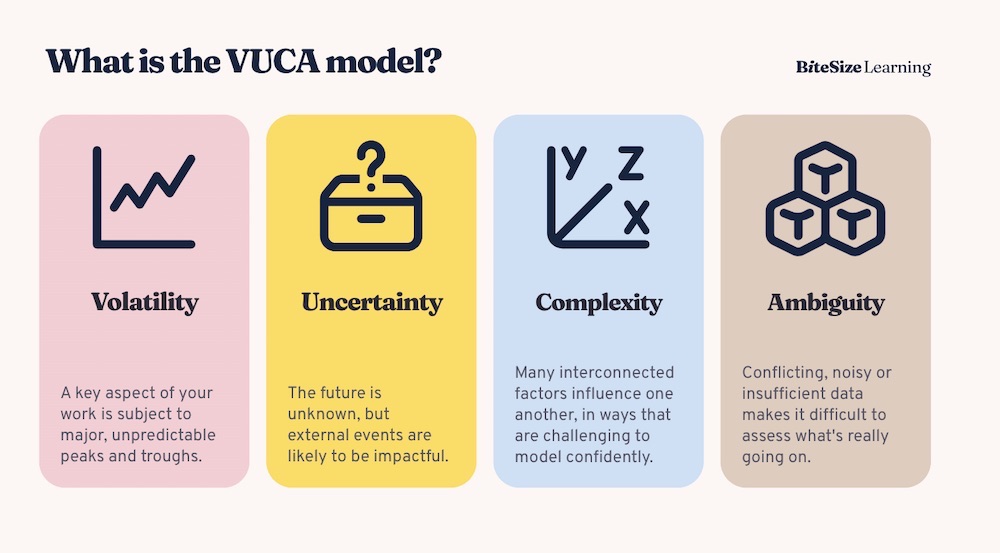The Relevance of VUCA in Today’s Business Environment
In today’s fast-paced and ever-changing world, businesses face unprecedented challenges that require agility, foresight, and adaptability. This dynamic environment is often described by the acronym VUCA, which stands for Volatility, Uncertainty, Complexity, and Ambiguity. Originally coined by the U.S. military to describe the unpredictable conditions of modern warfare, VUCA has since been adopted by the business world to articulate the challenges organisations face in a rapidly evolving global landscape. As we navigate through 2024, the relevance of VUCA has only intensified, necessitating a strategic response from organisations aiming not just to survive but to thrive.
Related Concepts: VUCA Prime
In response to the challenges posed by VUCA, some thought leaders have proposed a counter-framework known as VUCA Prime, developed by Bob Johansen. VUCA Prime offers a set of leadership strategies designed to navigate the challenges of VUCA:
– Vision counters Volatility by providing a clear and compelling long-term direction.
– Understanding counters Uncertainty by fostering deep insight and awareness of the situation.
– Clarity counters Complexity by simplifying and focusing on what’s most important.
– Agility counters Ambiguity by promoting flexibility and adaptability in decision-making.
The Continued Relevance of VUCA
VUCA remains highly relevant in today’s business environment due to several factors:
- Globalisation and Interconnectedness: The global economy is more interconnected than ever, meaning that a disruption in one part of the world can have far-reaching impacts. The COVID-19 pandemic is a stark reminder of how a localised health crisis can quickly become a global economic catastrophe, underscoring the volatility and uncertainty inherent in global markets.
- Technological Advancements: The rapid pace of technological change introduces new complexities and ambiguities. Emerging technologies such as artificial intelligence, blockchain, and quantum computing present both opportunities and challenges. Organisations must be able to anticipate and adapt to these changes to maintain a competitive edge.
- Environmental and Social Shifts: Issues like climate change, social justice movements, and shifts in consumer behaviour driven by ethical considerations add layers of complexity to the business environment. Companies are now expected to not only deliver financial returns but also demonstrate social and environmental responsibility.
Given these conditions, organisations must develop strategies that address the critical needs required to navigate a VUCA world successfully. Below are three such needs:
- Robust Market Research and Intelligence
In a VUCA environment, the ability to gather, interpret, and act on market intelligence is crucial. Robust market research allows organisations to stay ahead of trends, understand shifting consumer preferences, and anticipate potential disruptions. This proactive approach enables companies to make informed decisions, pivot strategies when necessary, and capitalise on emerging opportunities.
Key Insight: Continuous market research should be integrated into the organisational culture, rather than being treated as a one-time activity. Companies need to invest in advanced data analytics and cultivate a mindset of curiosity and openness to new information.
- Strong Purpose-Driven Values and Culture
In an uncertain and complex environment, a strong organisational culture anchored in purpose-driven values becomes a critical stabilising force. Such a culture provides employees with a sense of direction and motivation, fostering resilience and adaptability. Moreover, companies with a clear purpose are better equipped to attract and retain talent, as well as to build stronger relationships with customers and stakeholders.
Key Insight: Purpose-driven companies are not only more resilient but also more innovative. A clear sense of purpose aligns the organisation’s goals with broader societal needs, creating a sustainable competitive advantage.
- Agile and Adaptive Leadership
Leadership that is agile and adaptive is essential for navigating the VUCA environment. Leaders must be able to make quick decisions in the face of uncertainty, inspire and motivate their teams, and drive change effectively. This requires a combination of emotional intelligence, strategic thinking, and the ability to foster a culture of continuous learning.
Key Insight: The most effective leaders in a VUCA world are those who embrace change, encourage experimentation, and empower their teams to take calculated risks. They recognise that failure can be a valuable learning experience and are not afraid to pivot when necessary.
Recommended Reading for Thriving in a VUCA World
Several books have explored the concept of VUCA and provided valuable insights on how organisations can thrive in such an environment:
- “Leaders Make the Future: Ten New Leadership Skills for an Uncertain World” by Bob Johansen: This book explores the skills leaders need to navigate a VUCA world, emphasising the importance of foresight, adaptability, and resilience. Johansen introduces the concept of “VUCA Prime,” a framework that counters the challenges of VUCA with Vision, Understanding, Clarity, and Agility.
- “The Lean Startup: How Today’s Entrepreneurs Use Continuous Innovation to Create Radically Successful Businesses” by Eric Ries: Ries’s book is a seminal guide to building agile, adaptive organisations. The Lean Startup methodology emphasises the importance of learning and adapting quickly, making it particularly relevant for businesses operating in a VUCA environment.
- “Team of Teams: New Rules of Engagement for a Complex World” by General Stanley McChrystal: Drawing on his experiences in the military, McChrystal explores how organisations can become more agile and responsive in a VUCA world. The book highlights the importance of decentralised decision-making and empowering teams to operate with autonomy.
- “Legacy: What the All Blacks Can Teach Us About the Business of Life” by James Kerr: This book draws lessons from the legendary New Zealand rugby team, the All Blacks, focusing on leadership, culture, and resilience. Kerr emphasises the importance of values, humility, and continuous improvement—qualities that are essential for thriving in a VUCA world. The All Blacks’ approach to building a lasting legacy through a strong, purpose-driven culture and a commitment to excellence offers powerful insights for businesses looking to succeed in a complex, rapidly changing environment.
The VUCA world is here to stay, and organisations that wish to survive and thrive must adopt strategies that address its inherent challenges. By investing in robust market research, cultivating a strong purpose-driven culture, and fostering agile leadership, companies can build the resilience and adaptability needed to succeed in a volatile, uncertain, complex, and ambiguous world. Through continuous learning and a willingness to embrace change, these organisations can not only navigate the challenges of VUCA but also seize the opportunities it presents.




